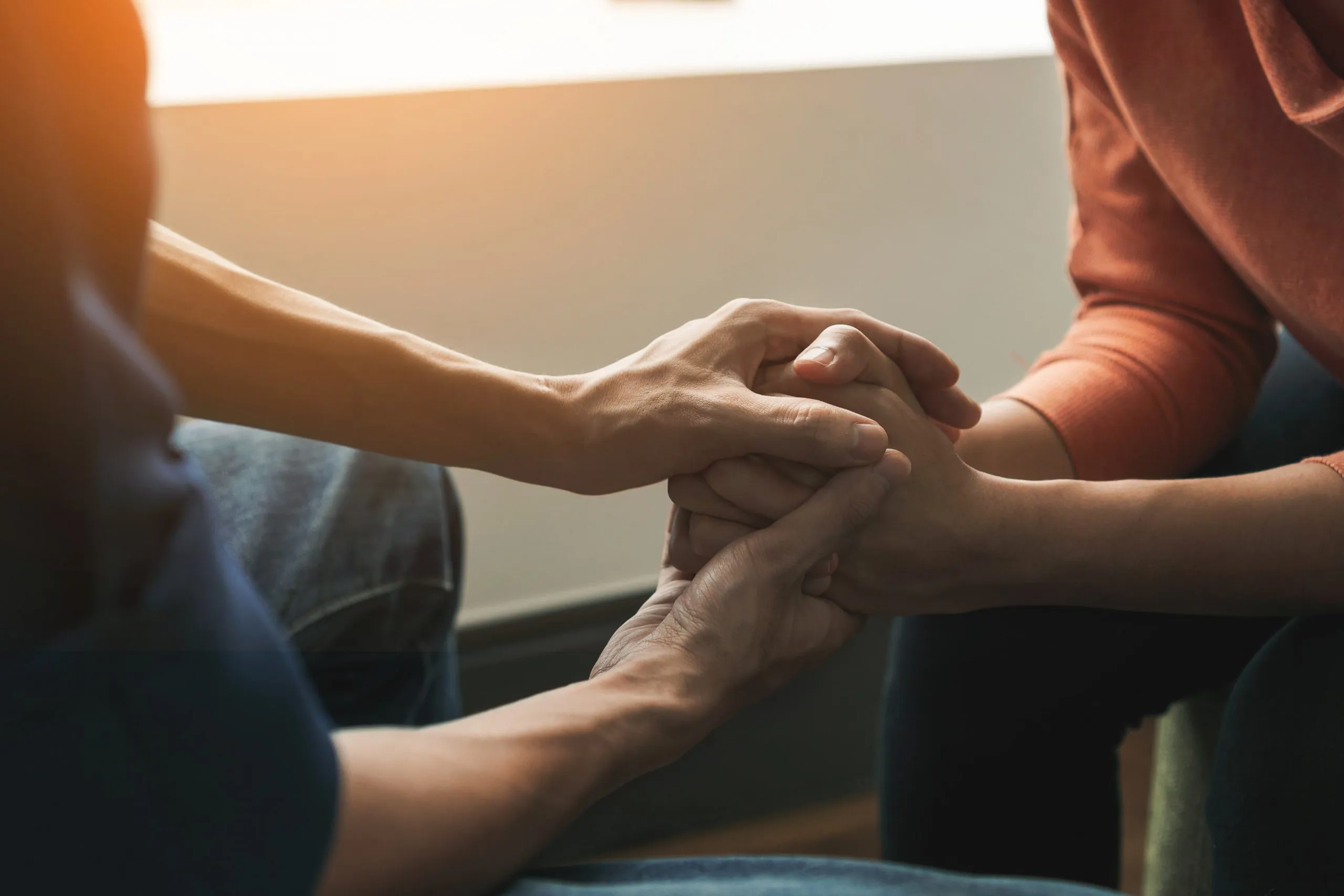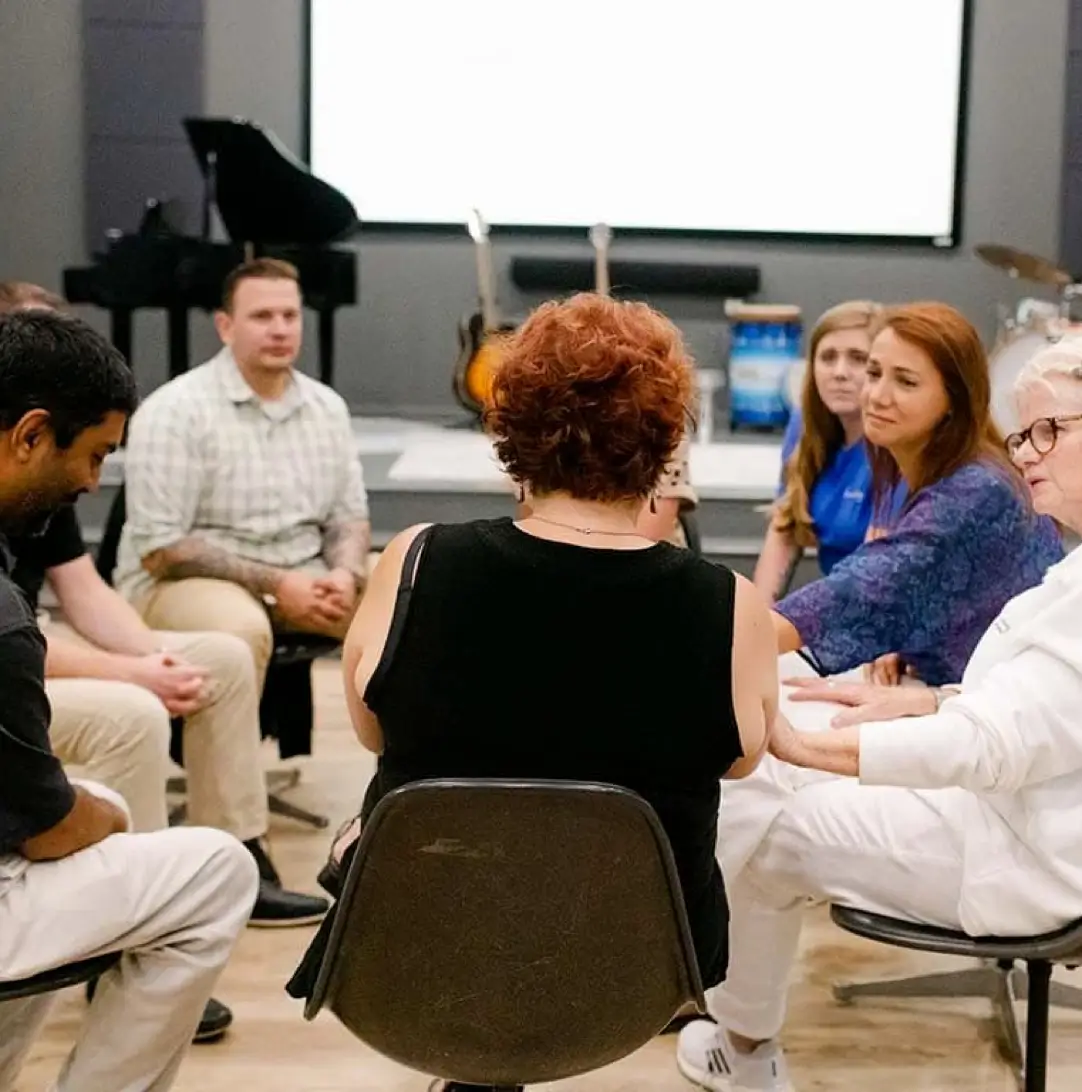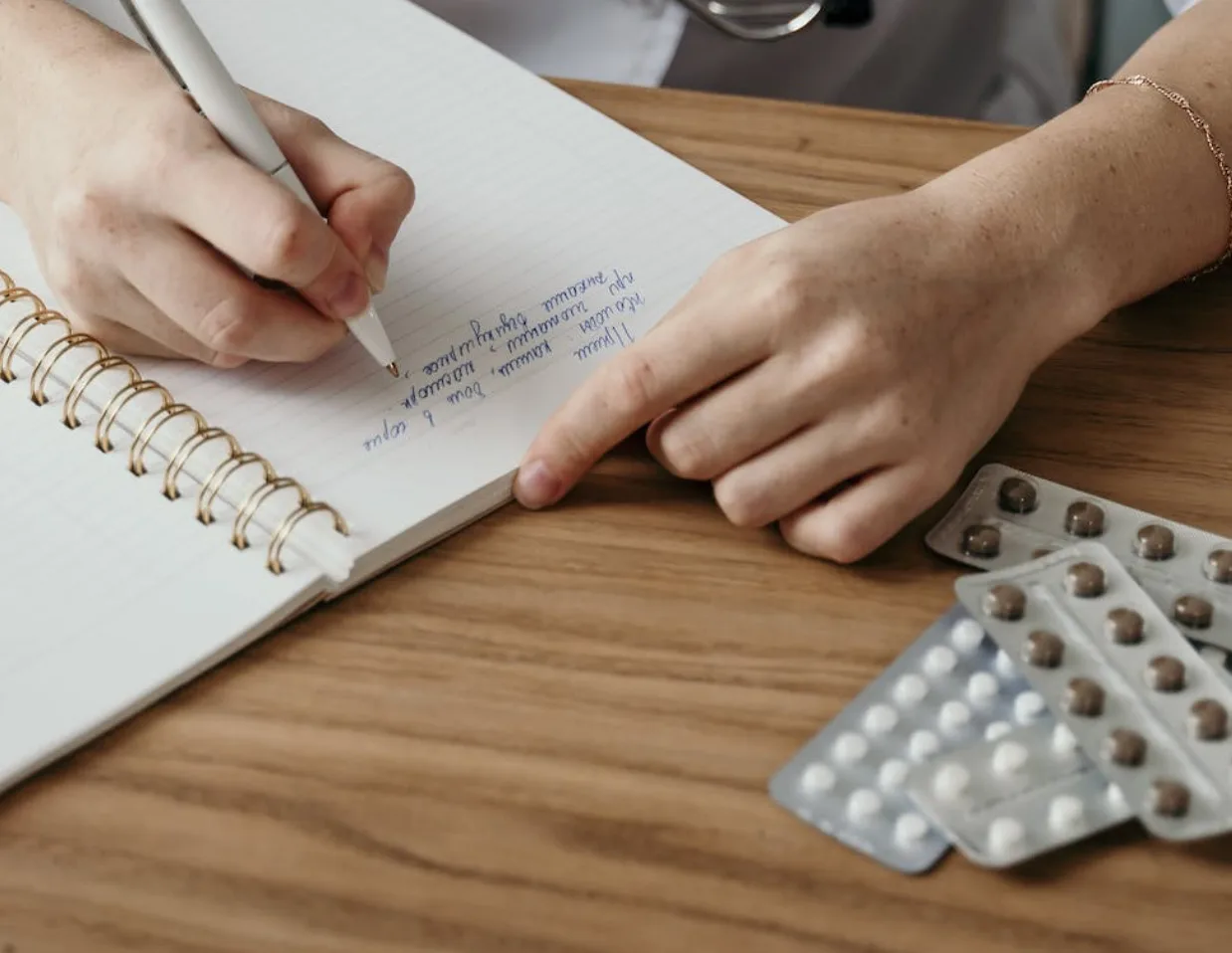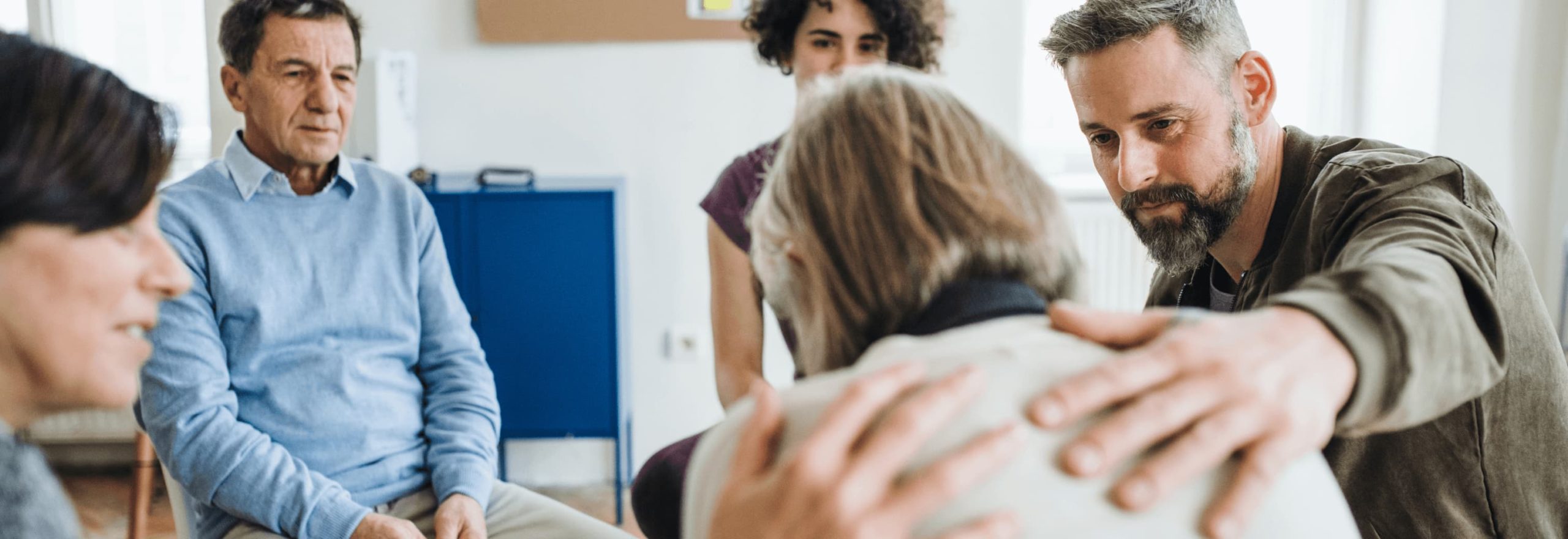Common signs include intense urges to use substances, requiring larger amounts to achieve the same effects, failing to meet responsibilities due to substance use, continuing use despite negative consequences, engaging in risky behavior while under the influence, inability to stop using, and experiencing withdrawal symptoms. If substance use is interfering with your life, relationships, or health, professional treatment can help.


At Beachway Therapy Center in South Florida, we offer personalized addiction treatment programs and integrated mental health care that are crafted specifically to meet your recovery goals and lead you toward lasting sobriety.
Understanding the Connection: Research shows that up to 90% of individuals seeking addiction treatment also experience co-occurring mental health conditions. Our comprehensive treatment programs for addiction are designed around this understanding, providing integrated care that treats both addiction and underlying mental health issues simultaneously for more effective, lasting recovery outcomes.
Our evidence-based addiction treatment programs in South Florida are available to clients nationwide, with specialized localized care for those seeking addiction treatment programs in South Florida, specifically. Whether you’re just starting your recovery journey, continuing previous treatment, or seeking support for both addiction and mental health conditions, Beachway is here to support you in whatever way you need.


Comprehensive Addiction Treatment Programs Tailored to You
We build our addiction treatment programs around evidence-based clinical structure and individual recovery needs. Beachway begins with a full assessment to determine whether a patient is dealing with addiction, mental health complications, or both—recognizing that successful long-term recovery often requires treating these interconnected conditions together.
The Science of Addiction Recovery: Addiction is a chronic brain disease that requires ongoing management, much like diabetes or heart disease. Our addiction treatment programs are designed around this medical understanding, providing tools for long-term recovery maintenance rather than just short-term stabilization. This approach has been shown to significantly improve recovery outcomes, with research indicating that individuals receiving integrated treatment for co-occurring disorders have better long-term success rates compared to those receiving addiction treatment alone.
For many, treatment typically starts with a medically supervised detox, followed by residential care that offers daily therapeutic support and skill-building for sustainable sobriety. During this phase, patients learn to identify triggers, develop healthy coping mechanisms to replace substance use, and build the foundation for long-term recovery.
Beachway also offers flexible outpatient programs, including Partial Hospitalization (PHP) and Intensive Outpatient Programs (IOP) for those seeking structure and support without a full-time residency. These programs focus heavily on relapse prevention, community integration, and maintaining recovery while rebuilding daily life responsibilities.
All of our addiction treatment programs in South Florida utilize evidence-based therapies like CBT and DBT, as well as holistic approaches like meditation and yoga classes that support both addiction recovery and mental health healing.
Our accredited facility holds Joint Commission certification and is licensed by the Florida Department of Children and Families, ensuring the highest standards of care for both addiction treatment and mental health services.
Who May Benefit From a Treatment Program?
Beachway works explicitly with individuals facing a wide range of substance use and co-occurring mental health disorders. Our addiction treatment programs in South Florida serve both local residents and those traveling for care, offering a safe, private space for comprehensive recovery that addresses the whole person.
We help adults struggling with:
-
- Alcohol and drug addiction, including prescription drug dependence
- Depression, anxiety, PTSD, and other mental health conditions that often co-occur with addiction
- Dual diagnosis and complex co-occurring disorders
- Chronic relapse or previous treatment attempts that didn’t lead to sustained recovery
- Trauma-related addiction and self-medication patterns
- Family and relationship issues stemming from addiction
We tailor each recovery program for addiction based on individual clinical needs, treatment history, addiction severity, and long-term recovery goals. We also offer comprehensive family support services to help rebuild relationships impacted by substance use and addiction, recognizing that healing the family system is crucial for sustainable recovery.
How Our Recovery Programs for Addiction Work
Our recovery programs for addiction follow a detailed, step-by-step model designed around the latest addiction science to help individuals regain stability, build recovery skills, and move forward with purpose and confidence in their sobriety.
The comprehensive intake process evaluates all of the following:
-
- Substance use history and patterns of addiction
- Previous hospitalization and treatment history
- Mental health and diagnosis history, including trauma
- History of self-harm, overdose, or suicidal ideation
- Co-occurring eating disorders or other behavioral addictions
- Medication history and current medical conditions
- Social support systems and family involvement
- Employment status and housing stability
- Legal issues related to substance use
- Previous recovery attempts and what worked/didn’t work
Recovery-Focused Assessment: Beyond clinical evaluation, we assess each person’s readiness for change, motivation for recovery, and personal recovery goals. This helps us recommend a level of care that not only meets medical necessity but also aligns with where you are in your recovery journey.
Then, based on this comprehensive assessment, the Beachway team will recommend a level of care that works best for your recovery journey while building in relapse prevention planning from day one.
Learn more about trauma and addiction signs in our educational guide.

Our Structured Treatment Programs for Addiction and Mental Health
Beachway offers a full continuum of treatment programs for addiction and mental health, each built to provide structure, clinical support, and flexibility across all stages of recovery. We define each level of care – from detox to outpatient – with smooth transitions that support long-term progress and relapse prevention.
Our treatment plans will meet medical necessity, personal history, and the individual recovery goals of each person we serve. Below is detailed information outlining our specific addiction treatment programs and how they integrate mental health care.
Detoxification Programs
Substance use disorders typically require medical detox before addiction treatment can begin. At Beachway, detox takes place in a fully supervised inpatient setting with licensed medical staff on hand 24/7, ensuring both safety and comfort during the withdrawal process.
Our detox program includes:
- 24/7 medical monitoring and intervention
- Medication-assisted treatment (MAT) when appropriate
- Comfort medications to ease withdrawal symptoms
- Initial mental health assessment and stabilization
- Preparation for the next level of addiction treatment
The length of detox depends on the substances involved and the severity of withdrawal symptoms. This can range from brief observation to extended monitoring, typically 3-7 days.
Once detox is complete, patients can immediately begin residential care to continue their recovery program with a focus on building long-term sobriety skills.
Inpatient Programs
Inpatient recovery programs for addiction at Beachway give patients the time and space to focus entirely on getting healthier while learning essential recovery skills in a supportive, structured environment.
With 24-hour support and daily clinical programming, this level of care is ideal for stabilizing both substance use and co-occurring mental health concerns. Residents can participate in individual and group therapy sessions, holistic therapies, family therapy, and daily treatment planning focused on building a sustainable recovery lifestyle.
Inpatient treatment includes:
- Individual therapy 3-5 times per week
- Daily group therapy focused on recovery skills
- Psychiatric care and medication management
- Family therapy and education sessions
- Relapse prevention planning and trigger identification
- Life skills training for recovery maintenance
- Recreational therapy and wellness activities
Our team offers integrated tracks that address both substance use and mental health simultaneously, ensuring focused care that recognizes the interconnected nature of these conditions. Inpatient treatment provides the foundation for long-term success by establishing healthy patterns and coping strategies essential for sustained recovery.
Outpatient Programs
Our outpatient addiction treatment programs offer clinical structure with the flexibility to live at home, return to work, or manage family responsibilities while maintaining strong recovery support. Beachway provides two different options: a Partial Hospitalization Program (PHP) for intensive daytime treatment and an Intensive Outpatient Program (IOP) that meets throughout the week.
PHP (Partial Hospitalization Program):
- 6 hours of treatment per day, 5-7 days per week
- Intensive therapy while living at home
- Ideal for those stepping down from inpatient care
- Strong focus on relapse prevention and community integration
IOP (Intensive Outpatient Program):
- 3 hours of treatment, 3-5 days per week
- Flexible scheduling for work and family commitments
- Ongoing support for maintaining recovery in daily life
- Alumni support and long-term recovery planning
These treatment programs for addiction are crafted for individuals who no longer need residential care but still require professional support, accountability, and continued skill-building for sustained recovery.
Specialty Programs
Finally, Beachway’s specialty addiction treatment programs in South Florida offer additional layers of customization based on personal beliefs, specific needs, and long-term recovery goals.
Faith-based treatment incorporates spirituality into recovery for those who find strength in their religious or spiritual beliefs, while long-term care extends structure beyond the typical 30-day model for individuals who need extended support.
Specialty programs include:
- Faith-based recovery tracks
- Extended residential care (60-90+ days)
- Young adult specialized programming
- Executive/professional recovery programs
- Alumni support and mentorship programs
Every one of our patients works with a therapist to develop a comprehensive aftercare plan that includes ongoing therapy, community support, relapse prevention strategies, and specific tools that work for their unique recovery needs and lifestyle.


The Science Behind Dual Diagnosis Treatment
Those working through substance abuse disorders also experience co-occurring conditions like anxiety, depression, or trauma. According to SAMHSA’s National Survey on Drug Use and Health, individuals with mental health disorders are twice as likely to develop substance use disorders, and vice versa.
That’s why Beachway Therapy Center offers integrated addiction treatment programs that address both addiction and mental health conditions in one coordinated plan. This dual diagnosis approach recognizes that sustainable recovery requires treating the whole person, not just the addiction symptoms.
Why Integrated Treatment Works Better:
- Addresses root causes of addiction, not just symptoms
- Reduces risk of relapse by treating underlying mental health triggers
- Provides comprehensive coping strategies for both conditions
- Creates more sustainable, long-term recovery outcomes
- Helps patients understand the connection between their mental health and substance use
These treatment programs for addiction include clinical assessments, psychiatric support, and evidence-based therapies that we’ve crafted explicitly for dual diagnosis patients. Rather than treating addiction and mental health separately, our integrated approach ensures both conditions are addressed simultaneously.
Each addiction treatment program is individualized; however, all patients receive care that targets both mental health and substance use. After all, we believe treating one alongside the other leads to a better, more lasting recovery outcomes.
Building Relapse Prevention Skills
Our addiction treatment programs emphasize practical relapse prevention as a core component of sustainable recovery. Research shows that individuals who complete comprehensive relapse prevention training have significantly lower return-to-use rates.
Relapse prevention includes:
-
- Identifying personal triggers and high-risk situations
- Developing healthy coping strategies for stress, cravings, and difficult emotions
- Building accountability partnerships and support networks
- Creating emergency action plans for challenging moments
- Understanding the difference between lapse and relapse
- Developing lifestyle changes that support long-term sobriety
The HALT Method: Patients learn to recognize when they’re Hungry, Angry, Lonely, or Tired—common relapse triggers—and develop specific strategies for managing each state without turning to substances.
Family Healing in Addiction Recovery
Addiction affects entire family systems, often creating secondary trauma, enabling behaviors, and damaged relationships that can impact recovery success. Our family therapy programs help heal these relationships while educating loved ones about addiction as a chronic medical condition.
Family support includes:
-
- Education about addiction as a brain disease, not a moral failing
- Communication skills training for healthy relationship rebuilding
- Boundary setting that supports recovery without enabling
- Healing secondary trauma experienced by family members
- Understanding their role in supporting long-term recovery
- Breaking generational patterns of addiction and dysfunction
Family Therapy Sessions: Regular family therapy sessions help address the hurt, anger, and mistrust that addiction creates while rebuilding healthy family dynamics that support sustained recovery.

Recognizing Mental Health and Addiction Warning Signs
Early recognition of symptoms can be critical when seeking help through professional addiction treatment programs. Whether someone is living with a mental health condition, substance use disorder, or both, warning signs often show up in ways that you shouldn’t ignore.
Common indicators that your loved one may need addiction treatment programs include:
-
- Sudden changes in mood, behavior, or energy levels, especially related to substance availability
- Increased substance use to cope with emotions, stress, or daily life
- Withdrawing from relationships, work, or daily responsibilities
- Persistent feelings of hopelessness, irritability, or emotional numbness
- Difficulty managing routines, hygiene, or decision-making
- Sleep disturbances, appetite changes, or unexplained physical symptoms
- Escalating risk-taking or reckless behavior while under the influence
- Continued substance use despite negative consequences
- Failed attempts to cut down or stop using substances
- Physical withdrawal symptoms when substances aren't available
Mental Health Warning Signs That Often Co-occur with Addiction:
-
- Using substances to self-medicate anxiety, depression, or trauma symptoms
- Panic attacks or severe anxiety that seem to trigger substance use
- Mood swings that correlate with substance use patterns
- Social isolation that increases during periods of heavy use
- Suicidal thoughts or self-harm behaviors
Beachway’s recovery programs for addiction in South Florida are designed to assess these symptoms from day one, helping individuals and families understand when it’s time to seek critical care and how mental health symptoms may be driving addictive behaviors.
Can Mental Illness and Addiction Be Treated Together? We Know They Can
Yes, mental health conditions are treatable and recoverable, primarily when addressed alongside substance use in a structured program. At Beachway, our treatment includes evidence-based therapies, psychiatric care, and ongoing evaluation to support both emotional and behavioral health.
At Beachway, our integrated treatment includes evidence-based therapies, psychiatric care, and ongoing evaluation to support both emotional, behavioral, and addiction recovery health. By identifying the connection between substance use and mental health early in the process, our addiction treatment programs can help deliver coordinated care that improves long-term outcomes.
Evidence-based treatments we use include:
-
- Cognitive Behavioral Therapy (CBT) for changing thought patterns that drive both addiction and mental health symptoms
- Dialectical Behavior Therapy (DBT) for emotional regulation and distress tolerance
- Trauma-focused therapy for addressing underlying trauma that often drives addiction
- Motivational Interviewing to build internal motivation for change
- Contingency Management for reinforcing positive recovery behaviors
The goal isn’t just stability—it’s giving people the comprehensive tools they need to manage both their mental health and their recovery well after treatment ends.

Ongoing Support Beyond Treatment
Alumni Program and Continuing Care
Alumni services include:
-
- Monthly alumni meetings and social events
- Access to continued counseling and support groups
- Career and educational guidance for rebuilding life in recovery
- Crisis intervention support during challenging times
- Mentorship opportunities with successful alumni
- Family support services for ongoing relationship healing
Continuing Care Planning: Every patient develops a detailed continuing care plan that includes specific strategies for maintaining recovery, building a sober support network, and accessing resources when challenges arise.


Start Your Recovery Journey With Our Addiction Treatment Programs
Getting help shouldn’t feel overwhelming or inaccessible. At Beachway Therapy Center, we strive to make it easier than ever to take the first step—no matter how hard it may feel.
Our care team is here to guide you through the process, starting with initial assessment to personalized care planning and beyond. Whether you need detox, residential treatment, or outpatient support, our treatment programs for addiction offer a clear, steady path forward that addresses both addiction and mental health needs.
Insurance and Accessibility: We accept most major insurance plans and work with your provider to maximize coverage. Our admissions team will help determine your benefits and any out-of-pocket costs before admission, ensuring treatment is accessible when you need it most.
Reach out to learn more about our addiction treatment programs in South Florida to see if our integrated services are right for you or your loved one.

reviews
Frequently Asked Questions about Addiction Treatment Programs
How do I know if I need addiction treatment?
What makes dual diagnosis treatment different from addiction-only treatment?
Dual diagnosis treatment recognizes that addiction and mental health conditions often fuel each other. Instead of treating them separately, we address both simultaneously, which research shows leads to better outcomes. This means you'll receive psychiatric care, mental health therapy, and addiction treatment in one coordinated plan.
What is the success rate of your addiction treatment programs?
Success rates vary based on individual factors, but our integrated approach to treating both addiction and mental health significantly improves outcomes. Studies show that comprehensive dual diagnosis treatment can reduce relapse rates by up to 60% compared to treating addiction alone. We track our outcomes and can discuss specific success metrics during your consultation.
How do you handle relapse during or after treatment?
Relapse is often part of the recovery process, not a failure. We build relapse prevention skills from day one and have protocols for addressing relapse quickly if it occurs. Our alumni program provides ongoing support, and we offer readmission services when needed. The key is getting back on track quickly with professional support.
What insurance do you accept?
We accept most major insurance plans and work with your provider to verify coverage for both addiction treatment and mental health services. Our admissions team will help determine your benefits and any out-of-pocket costs before admission.
How long does treatment take?
Treatment length varies based on individual needs and recovery goals. Detox typically lasts 3-7 days, residential treatment averages 30 days (but can be longer), and outpatient programs can continue for several months to a year. We believe in providing the level of care you need for as long as you need it.
Is my information kept confidential?
Yes, all patient information is strictly confidential and protected under HIPAA regulations. We only share information with your explicit written consent or as required by law. Your privacy and dignity are paramount throughout treatment.
How do you support families affected by addiction?
We recognize that addiction affects entire families. We offer family therapy sessions, educational resources about addiction and mental health, support groups for family members, and help in rebuilding healthy relationships. Family involvement significantly improves recovery outcomes.
What happens after treatment ends?
We develop comprehensive aftercare plans including ongoing therapy, support group connections, relapse prevention strategies, alumni programs, and continued psychiatric care if needed. Recovery is a lifelong journey, and we provide tools and support for long-term success.

Resources for Families and Loved Ones
Understanding Addiction
as a Family Disease
Addiction affects entire families, not just the individual struggling with substance use. We provide comprehensive educational resources to help families understand:
- How addiction impacts brain chemistry and behavior, making it a medical condition
- The relationship between mental health and addiction
- Warning signs of relapse and how to respond appropriately
- Healthy communication strategies that support recovery
- Setting appropriate boundaries that help without enabling
- Self-care strategies for family members dealing with secondary trauma
- How to rebuild trust and relationships damaged by addiction
Emergency Resources
If you or a loved one is experiencing a mental health or addiction crisis:
- National Crisis Lifeline: 988 (24/7, free, confidential)
- SAMHSA National Helpline: 1-800-662-4357 (24/7, free, confidential treatment referral)
- Crisis Text Line: Text HOME to 741741
- National Suicide Prevention Lifeline: 1-800-273-8255
For immediate medical emergencies, call 911.
Educational Materials
- What is Substance Abuse Treatment? A Booklet for Families
- Family Therapy Can Help: For People in Recovery From Mental Illness or Addiction
- Support group locator for families affected by addiction
- Understanding insurance coverage for addiction and mental health treatment
- How to stage an intervention safely and effectively


Take the First Step Today
Recovery from addiction and mental health conditions is possible with the right support, evidence-based treatment, and comprehensive care that addresses your unique needs. At Beachway Therapy Center, we’re committed to helping you or your loved one achieve lasting recovery through our integrated approach to addiction and mental health treatment.
Contact us today to learn more about our addiction treatment programs in South Florida







